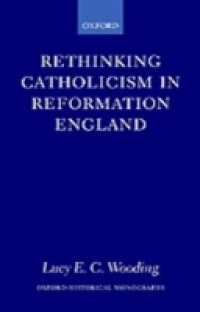This book considers the ideological development of English Catholicism in the sixteenth century, from the complementary perspectives of history, theology, and literature. Lucy Wooding argues that Erasmian humanism had laid the foundations for Catholic reformation in England, but that it was Henry VIII who turned an intellectual trend into an actual reform programme, reshaping English Catholicism in the process. The reformist strand within Catholic thought remained influential duringthe reign of Mary I, and in the early Elizabethan period, but was then reconfigured by the experience of exile and the onset of the drive for Counter-Reformation uniformity. Dr Wooding shows that Catholicism in this period was neither a defunct tradition, nor one merely reacting to Protestantism, but a vigorous intellectual movement responding to the reformist impulse of the age. Its development illustrates the English Reformation in microcosm: scholarly, humanist, didactic, and preserving its own peculiarities independent of European trends. Rethinking Catholicism in Reformation England makes an important contribution to the intellectual history of theReformation.

